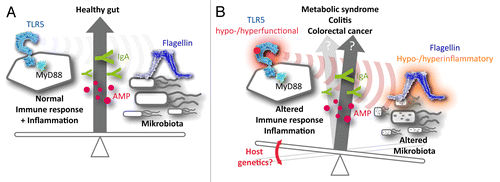Figures & data
Figure 1. Hypothetical influence of Toll-like receptor genetics on intestinal diseases. (A) Under physiological conditions, the immune system and the intestinal microbiota are in mutual equilibrium. In this scenario, Toll-like receptor (TLRs) sense intestinal bacteria and exert a selective pressure on the microbiota by promoting the secretion of antimicrobial effectors, including IgAs and antimicrobial peptides (AMPs). (B) In a genetically predisposed host (or due to other causes not discussed here), the activity of pattern-recognition receptors (PRRs) such as TLR5 may be altered, impacting on the release of several immunomodulatory molecules. This affects the selective pressure exerted by the host immune system on the intestinal microbiota, changing its composition in terms of phylotype and taxonomy. In turn, this favors a shift in the inflammatory potential of microbe-associated molecular patterns like flagellin, further altering the activity of TLR5 and other PRRs. Thus, it is conceivable that functionally relevant genetic variations affecting the PRR system alter the delicate equilibrium that normally exists between the host immune system and the gut microbiota, favoring the insurgence of intestinal diseases including colorectal carcinoma.

